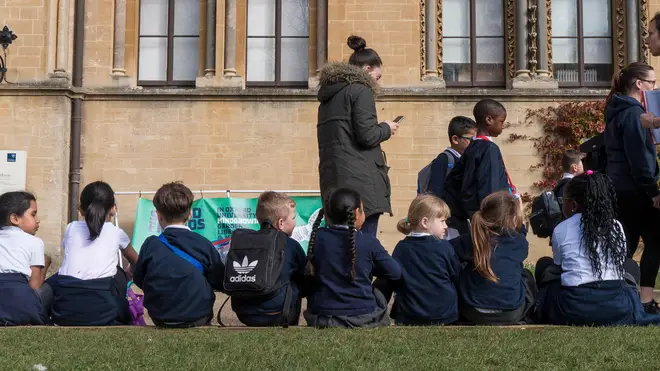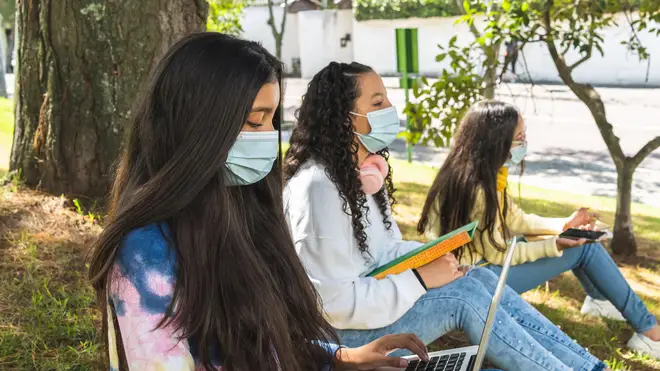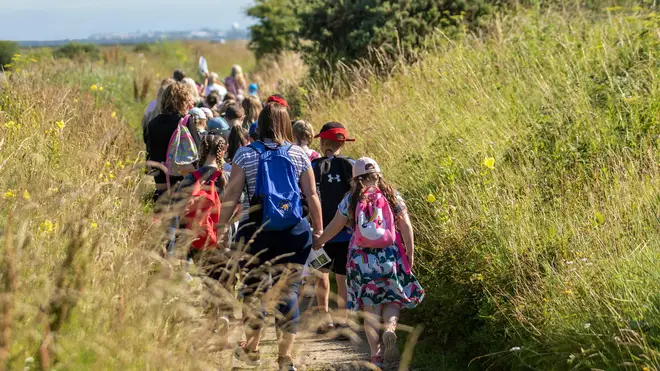
Paul Brand 10am - 12pm
19 August 2021, 00:07 | Updated: 24 August 2021, 09:51

The government has been criticised for suggesting schools should consider outdoor lessons if five pupils who are likely to have mixed closely test positive for Covid.
Guidance issued to schools within a Department for Education document (DfE) was branded a "total fudge" by a leading schools union.
Geoff Barton, general secretary of the Association of School and College Leaders (ASCL), instead called for "an urgent plan, backed up by cast-iron investment" to install ventilation equipment in school buildings as soon as possible.
He slammed the guidance for suggesting thresholds that could be used to indicate when an education or childcare setting should seek public health advice if they are concerned.
A-level results day: London state school outperforms Eton with Oxbridge targets
Read more: Daily testing in schools 'just as effective' as isolation in controlling cases

One of those included when five children, pupils, students or staff - who are likely to have mixed closely - test positive for coronavirus within a 10-day period.
Another is when 10 per cent of children, pupils, students or staff who are likely to have mixed closely test positive within 10 days.
The document says: "At the point of reaching a threshold, education and childcare settings should review and reinforce the testing, hygiene and ventilation measures they already have in place."
Read more: Flu jab to be offered to 35m people including secondary school students
Read more: Schoolchildren missed out on a third of learning during Covid-19 pandemic

Minister says children "don't need to" wear masks in schools
It adds that settings should also consider "whether any activities could take place outdoors, including exercise, assemblies, or classes".
The guidance also says schools should consider "ways to improve ventilation indoors, where this would not significantly impact thermal comfort" and "one-off enhanced cleaning focussing on touch-points and any shared equipment".
It adds that education settings should ensure their contingency plans cover the possibility that "it may be advised that face coverings should temporarily be worn in settings in their area".
This may include face masks in communal areas and/or classrooms, for pupils, students and staff, the document said, adding that children of primary school age and in early years should not be advised to wear face coverings.

Mr Barton said: "We are concerned that the contingency framework is growing during the summer holidays and with very little time for schools and colleges to update their planning.
"They are now expected to have in place plans for extra action in the event of a certain number of coronavirus cases occurring within their setting.
"This would kick in before more stringent measures that might be advised by public health experts.
"The extra action listed is slightly bizarre in that it includes ways to improve ventilation when government advice amounts to no more than keeping open windows.
"The suggestion that schools could realistically consider holding assemblies and lessons outdoors during the autumn term, as temperatures plummet, is a total fudge on the government's part."

Union calls for proof removal of school Covid rules isn't political
He then called for an urgent plan, supported by a funding guarantee, to install ventilation equipment in schools as soon as possible.
Kevin Courtney, joint general secretary of the National Education Union (NEU), said: "We welcome the government producing some form of contingency plan for schools, although measures such as outside lessons will be difficult in winter.
"It is concerning that so few mitigations are in place for September, in spite of their obvious benefits to ensuring children stay in school and do so safely."
He added that the NEU is urging ministers to provide funding to improve classroom ventilation and to supply CO2 monitors to help schools track air quality.